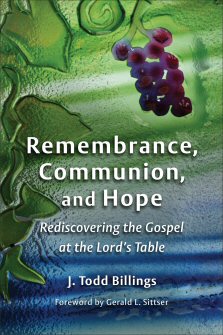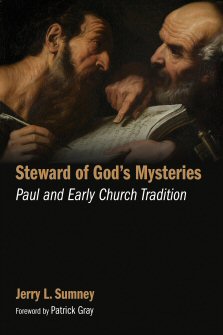Hang around seminary libraries long enough and you’ll start to recognize certain publishers, like Eerdmans.
And you’ll start to reach for their books more and more.
They were a consistent publisher in my bibliographies all throughout Bible school and seminary, so much that I had the publishing city memorized (Grand Rapids).
Here are five I found particularly tantalizing:
Remembrance, Communion, and Hope
Author: Todd Billings

“Todd Billings is one of our leading interpreters of John Calvin. He has given us here a superb study of Eucharistic theology in the Reformed tradition. A call to think deeply about what it means to encounter Jesus Christ in Word and sacrament.”
—Timothy George, Beeson Divinity School, Samford University
Steward of God’s Mysteries
Author: Jerry L. Sumney

Saved by Faith and Hospitality
Author: Joshua W. Jipp

Jipp first provides a thorough interpretation of the major biblical texts related to the practice of hospitality to strangers, considering especially how these texts portray Christ as the divine host who extends God’s welcome to all people. He then invites readers to consider how God’s hospitality sets the pattern for human hospitality, offering suggestions on how the practice of welcoming strangers can guide the Church in its engagement with current social challenges, such as immigration, incarceration, racism, and more.
Stories with Intent, 2nd Edition
Author: Klyne R. Snodgrass
Stories with Intent offers pastors and students a comprehensive and accessible guide to Jesus’ parables. Klyne Snodgrass vividly explores the historical context in which these stories were told, the part they played in Jesus’ overall message, and the ways in which they have been interpreted in the Church and the academy.
Snodgrass begins by surveying the primary issues in parables’ interpretation and providing an overview of other parables—often neglected in the discussion—from the Old Testament, Jewish writings, and the Greco-Roman world. He then groups Jesus’ more important parables thematically and offers a comprehensive treatment of each, exploring both their background and significance for today. This tenth-anniversary edition includes a substantial new chapter that surveys developments in the interpretation of parables since the book’s original 2008 publication.
Time and the Word
Author: Ephraim Radner
This book constitutes the first significant theological account of the foundations and methods of the figural reading of Scripture. Radner reintroduces contemporary scholars to a traditional approach to biblical interpretation that dates back to Jewish practice from before the time of Jesus. Embracing “spiritual” and “allegorical” ways of understanding the Bible, figural reading once offered a broad approach to reading Scripture—an approach that Radner here engages through a foundational theological lens.





